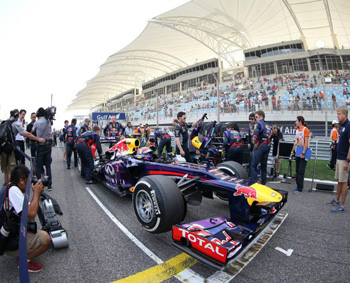Bahrain Report: 2013-2014 Overview
Bahrain Top Stories
Bahrain Report: 2013-2014 Overview
Amid slowed oil exports and political tensions, diversification continues, Bahrain remains a popular business and tourism destination and the potential for sectarian rapprochement exists – provided increasing political reforms.
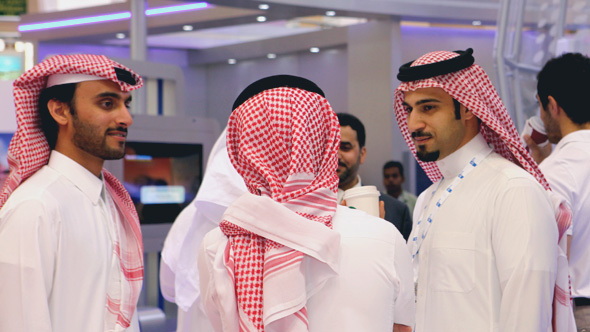
Bahrain Report: 2013-2014 Overview
Bahrain Report: Amid slowed oil exports and political tensions, diversification continues
By T.K. Maloy
MANAMA – Not comparatively rich in oil, this island kingdom, with a population of just over one million, was buffeted like all the region by the Arab Spring and though distinct political tension remain, the economy posted a solid 3.4 percent GDP growth figure for end year and is tipped for continued stronger growth for 2013.
Bahrain’s crude output from its mainstay Abu Safa field – shared with the KSA – marked a decline last year. The hydrocarbon sector posted an anemic 0.4 percent growth in the 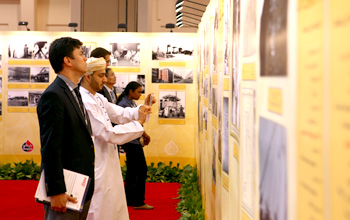 final quarter and dropped almost 8 percent on an annual basis.
final quarter and dropped almost 8 percent on an annual basis.
To give a sense of scale –without the Abu Safa field Bahraini oil production would only be around 40 000 barrels of oil per day compared to Saudi 10 million. Abu Safa adds 150,000 barrels to Bahrain’s production.
Large or small, all this production goes toward meeting the worldwide consumption of over 80 million barrels per day.
Bahrain is a non-OPEC exporter but politically and culturally aligned with giant neighbor Saudi Arabia, albeit the more liberal junior neighbor to the KSA.
Bahrain growth mostly driven by the non-oil sector
Growth in Bahrain for the year was chiefly driven by the non-oil sector of the Persian Gulf archipelago with Bahrain’s diversification an ongoing part of its economic and national story.
“Growth is also likely to pick up further in 2013 due to planned large-scale industrial investments and growth in infrastructure spending. The Bahraini economy is fairly resilient to external shocks and it is currently estimated that real GDP growth could exceed 6 percent this year,” the Economic Development Board said in a statement.
Growth in Bahrain for the year was chiefly driven by the non-oil sector of the Persian Gulf archipelago with Bahrain’s diversification an ongoing part of its economic and national story.
The EDB is a public agency established to attract foreign investment and manage economic growth.
Though enjoying steady oil and gas revenue, Bahrain, as noted, has definitively less reserves that its Gulf Cooperation Council neighbors and logically began to diversify the economy in the 1990s. The most quickly growing segment of the economy is the banking sector, which unseated Beirut more than a decade ago as being the favored regional hub for business and individual wealthy depositors.
Bahrain was named the world’s fastest growing financial center in the City of London’s Global Financial Centers Index in 2008, with the financial services and banking sector, including fast developing Islamic banking practices, benefiting from the kingdom’s proximity to high producing oil states.
The kingdom’s top industrial sectors include Aluminum Bahrain (Alba) and Gulf Aluminum Rolling Mill Company (GARMCO), along with Arab Iron and Steel Company, Gulf Petrochemical Co. (GPIC); and Bahrain Petrochemical Company (BAPCO) along with a shipbuilding and repair yard.
While diversification continues, oil and natural gas still maintain a dominant position in generating revenue, with the government making good use of these funds for investment.
Bahrain’s chief investment has been toward infrastructure, primarily in the transportation and telecoms sector, but also in industrial projects.
Profitable tourism sector
Along with being a center of business and finance in the Gulf, the investment in the infrastructure has helped usher in profitable tourism sector, mostly catering to GCC clientele.
“I think everybody is very optimistic about 2013. We at Elite Hospitality have forecasted revenues and average room rates and occupancies of a significantly higher percentage than 2012. There is buoyancy in the economy and investment” said Anurag Bajaj, general manger of Elite Resort & Spa. “This brings the business travelers which is our core business.”
He added, “There is (also) growing confidence of the leisure travelers from the Arab world. The fact that Manama is the tourism capital for the Arab world in 2013 is definitely a big boost for us and it is showing. The first two months have been extremely encouraging.”
Elite Resort & Spa, a four-star apartment hotel, is a getaway from the city, though close to the main business district and main shopping district, it is also near the airport.
Benefits for companies located in Bahrain
Symbolic of the kingdom’s push toward diversification is the huge @bahrain project – announced in 2009 – 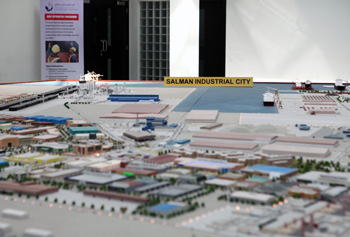 which when completed will encompass one million square meters of development. The project includes a state-of-the art exhibition and convention facility, four and five–star hotels complexes, retail and leisure establishments; along with entertainment, a technology park, research institute and educational space.
which when completed will encompass one million square meters of development. The project includes a state-of-the art exhibition and convention facility, four and five–star hotels complexes, retail and leisure establishments; along with entertainment, a technology park, research institute and educational space.
Cost — $2 billion, making it one of the largest investments by the government over the last half-decade. The project remains under construction.
The project undergoing construction is adjacent to the signature Bahrain International Circuit an award-winning raceway, which plays host the Bahrain Grand Prix, usually the kickoff to the global Formula One racing season. In addition to numerous other racing events.
The thought is that there will be definite synergies between the BIC and under-construction @bahrain.
Gerry Sharkey, Project Director at Bahrain International Investment Park (BIIP) noted the many upsides for companies locating in the country – which gives proximity other GCC nations, but in an environment with a long cultural connection to the UK and Europe.
“These companies want to be located in an environment that is business friendly and this is a country that has a history going back to the 1930s in oil production, where it was a beacon and a leader in the Middle East in terms of how you go about business and how you make business happen.” area is not much bigger than the District of Columbia.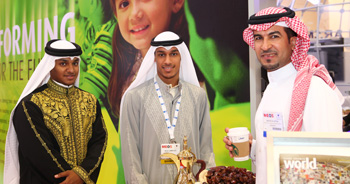
Bahrain International Investment Park, a 2.5 million square meter campus has thus far attracted over $1.5 billion of foreign direct and local investment. Over 20 additional new projects were approved for the park last year, including companies from Germany, Singapore, France, Saudi Arabia and Bahrain. By 2014, new projects are expected to yield an additional 6,000 positions for the local workforce.
Last year BIIP was voted the 15th most popular destinations for FDI by the Financial Times FDI Intelligence publication.
“In the week of the problems that happened here in February 2011, one of the biggest companies that has invested on this park made the final decision to go ahead. A couple of weeks earlier than that BASF, the biggest chemical company in the world, had decided to go ahead as well,” noted Sharkey regarding the continued confidence of foreign investors.
“These investments are part of the substantial amount, in excess of 500 million Bahraini Dinars which is about US$ 1.7 billion. This is a very significant investment in any environment but to have it happen during that period was a major success for Bahrain,” Sharkey said. “In 2012 we supported 22 projects to come onto this park, which brings the total to 88 allocated projects. These 22 new projects supported in 2012 were not put off by what happened here or by any other factor. 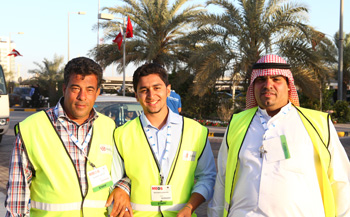 We believe that in 2013 and hopefully onwards we will continue to get more investment.”
We believe that in 2013 and hopefully onwards we will continue to get more investment.”
In a recent Reuters article, the EDB’s acting chief executive, Kamal Bin Ahmed, told the newswire , “In particular, the kingdom [of Bahrain] plays an important role as a gateway to the rapidly expanding GCC economies, and the opportunity this offers for investors is demonstrated by the strong performance of key non-oil and gas sectors.”
In a show of confidence of the kingdom’s security and stability, the top three upcoming trade shows — GulfBID, GulfInteriors and the Gulf Property Show –have been sold out, according to organizers.
Gender and gender equity in Bahrain
One might ask, regarding the political tensions if there is a gender issue involved as well as well political – the short answer is no, but there is room for improvement.
Mona Almoayyed, the Managing Director of Y.K. Almoayyed & Sons, one of Bahrain’s largest home-grown conglomerates, with a 6,000 person workforce, notes of gender equity in the kingdom that there is equality and then there is Equality.
“If we talk about women in terms of labor and the economic side of women versus men in the workplace, 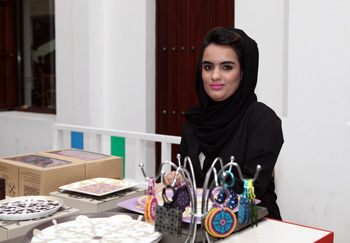 I think there is a certain amount of equality there. Women and men in Bahrain are paid the same wages; there is no differentiation according to the labor law,” Almoayyed said.
I think there is a certain amount of equality there. Women and men in Bahrain are paid the same wages; there is no differentiation according to the labor law,” Almoayyed said.
She added, however, that there is the not so nuanced discrimination of hiring men over women because of women’s family demands and expected time off for maternity leave.
“In my experience, we’ve been very lucky in employing Bahraini women in this company. We find that Bahraini women stay longer, they don’t change jobs, and they are very loyal,” Almoayyed explained. “Of course when they get pregnant this is a period of time when they are more absent, but we find that they are very hard workers.”
On a cultural note, the managing director added, “Bahraini women tend to be a bit more liberal in terms of dressing in European clothes and not having to wear the black veil. In Bahrain you see this is normal.”
Arab Spring – ongoing ramifications
Large-scale protests began in the Bahrain in early 2011 as the small kingdom’s Shia majority began to militate for increased political power and rights reforms. A cautious government at first allowed protest but then kicked off a crackdown in earnest with a raid on protesters camp at the Pearl Roundabout.
Shortly following this, Bahrain formally requested security assistance from Saudi Arabia along with other GCC countries, and subsequently 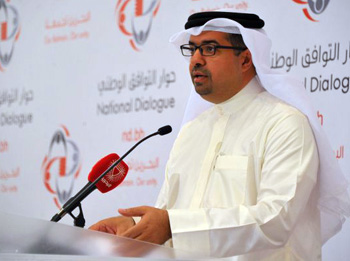 made a declaration of a three-month state of emergency. The crackdown included thousands of arrest, with piecemeal protest still ongoing by Shia activist – however, with much less intensity.
made a declaration of a three-month state of emergency. The crackdown included thousands of arrest, with piecemeal protest still ongoing by Shia activist – however, with much less intensity.
According to longtime Middle East analyst, Claude Salhani, in OilPrice.com, “When the king of Bahrain was on the verge of conceding to Shiite pressures and appointing a prime minister from their community, Saudi Arabia and the United Arab Emirates stepped in and dispatched troops to put down the rebellion.”
There have been questions following the crackdown over possible human rights violations of those arrested.
The sectarian unrest of Bahrain’s “Arab Spring” did not devolve into chaos or armed struggle – akin to elsewhere in the MENA region – but did set back the kingdom economically. Particularly, in the kingdom’s ongoing efforts to expand the banking sector and enhance its reputation as destination for business and for tourism.
While political tension remain unresolved – and economic observers believe a rapprochement between ruling Sunni government and Shia majority population is ultimately necessary – for the moment economic experts view the situation as not effecting the near-term growth of Bahrain.
Long-term growth, however, is another matter.
|
FAST FACTS: Bahrain is an archipelago country whose total land area is not much bigger than the District of Columbia. OTHER: Oil reserves: 125 million barrels of Bahrain’s onshore proven oil reserves are located in the Awali field, the first oil field to be developed in the Persian Gulf. Discovered in 1932, Awali’s crude oil production peaked at more than 75,000 barrels per day (bbl/d) in the 1970s. Population: 1,281,332 (estimate for mid-2013) |
